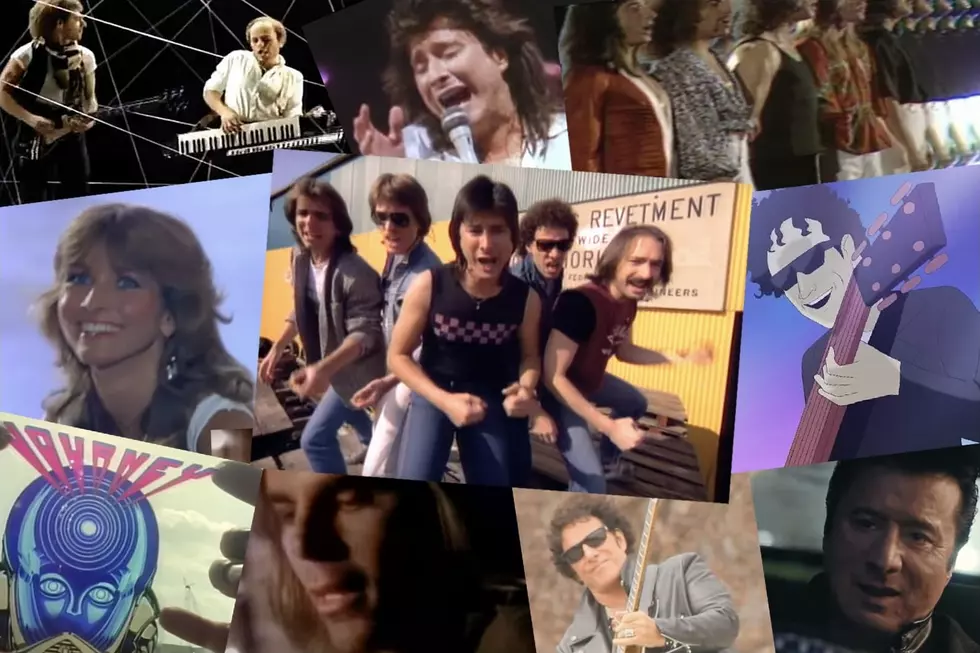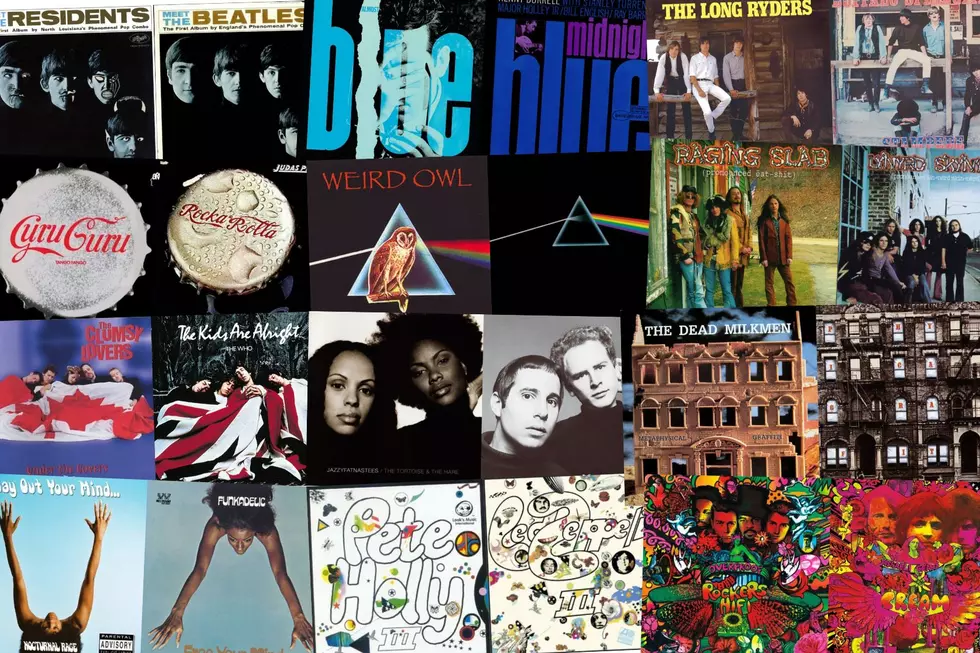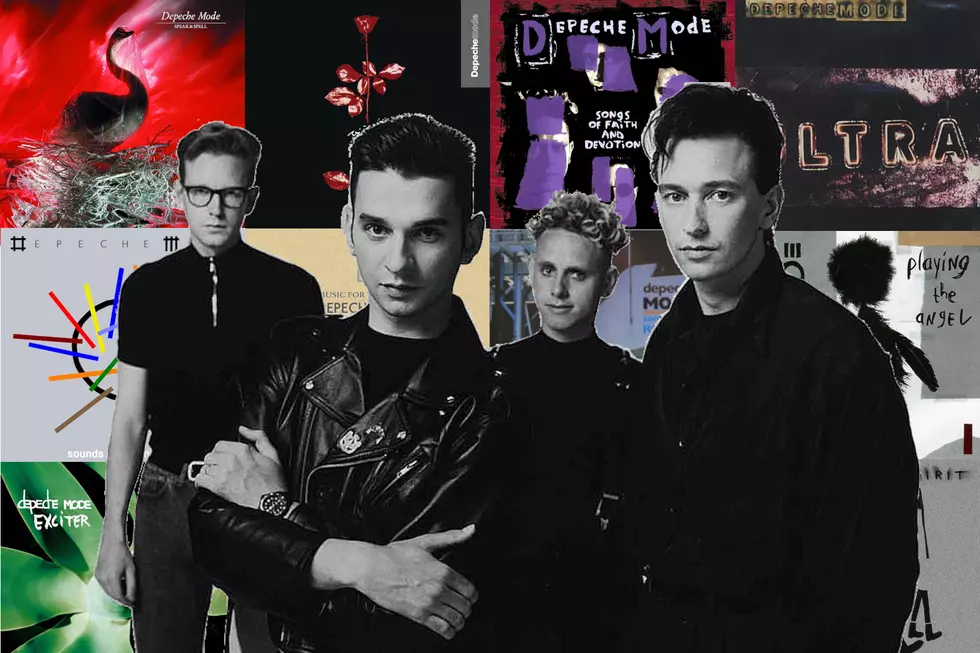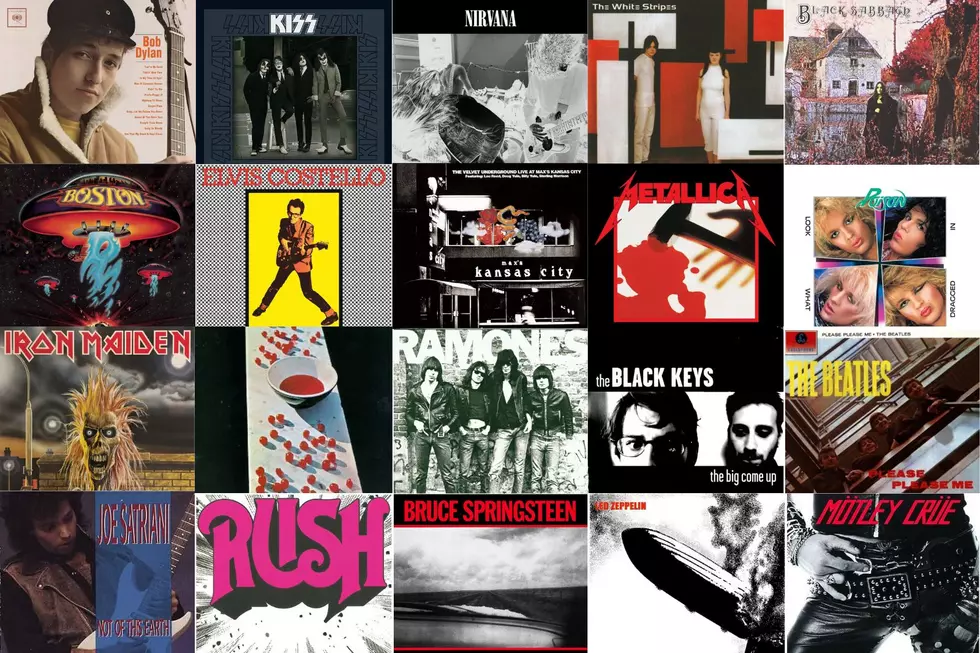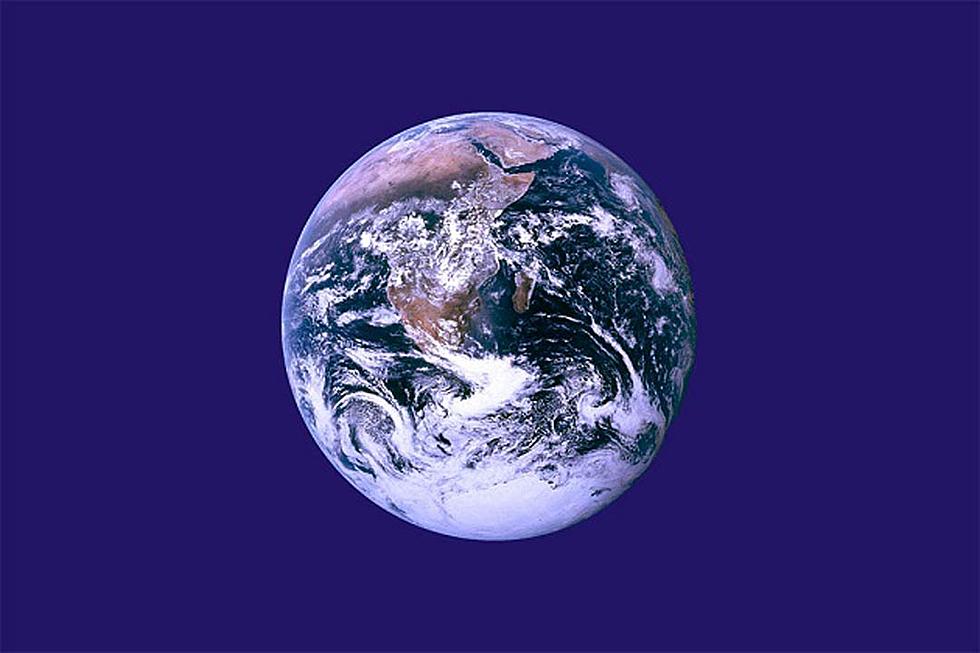
Top 20 Earth Day Songs
The first-ever Earth Day was celebrated on April 22, 1970, something we’re honoring with the Top 20 Earth Day Songs. Founded by U.S. Sen. Gaylord Nelson, Earth Day is acknowledged around the world, especially in schools where students are taught about environmental conservation and what everyone can do to support it. Of course, students of rock 'n' roll have been schooled in “green” ideas for decades, with prominent classic rock artists expressing their observations on the need to protect the planet we share. Below are some of the best Earth Day Songs.
- 20
‘Song for a Dying Planet’
Joe WalshFrom: ‘Songs for a Dying Planet’ (1992)
Joe Walsh’s 1992 solo album is his most earnest statement, in which he eschewed his trademark humor for direct observations about the state of the world. He closes the record with this spare, two-minute plea, in which he sings, “We’re killing everything that’s alive / And anyone who tries to deny it / Wears a tie / And gets paid to lie.” We hear a none-too-subtle metronome in the background – ticking away like a doomsday clock.
- 19
‘License to Kill’
Bob DylanFrom: ‘Infidels’ (1983)
This song, which came on the heels of Bob Dylan’s "born again" period, seems to call back to the singer’s heyday of finger-pointing songs. On "License to Kill," Dylan accuses mankind not just of poisoning the Earth’s natural resources, but also of running roughshod over everything in its path. “Man has invented his doom / First step was touching the moon," he sings, revealing his distaste for what he felt was the arrogance of the U.S. space program. Or maybe he was just reminding us that progress often has an unintended consequence.
- 18
‘The Trees’
RushFrom: ‘Hemispheres’ (1978)
Drummer Neil Peart wrote this Rush classic as a goofy, cartoon-ish story about different types of trees bickering in the forest like human beings. Although he claims there’s nothing deeper about "The Trees" than a silly story, others have perceived a message about how the natural world is superior to mankind when it comes to finding a way to coexist.
- 17
‘Mother Nature’s Son’
The BeatlesFrom: ‘The Beatles’ (1968)
Paul McCartney wrote this, one of the Top 20 Earth Day Songs, after listening to a lecture by the Maharishi during the Beatles’ time in India. (Similarly inspired, John Lennon wrote "Child of Nature," which would later become "Jealous Guy.") In the song, which builds from Macca’s acoustic guitar to an orchestral arrangement, the singer praises the natural beauty around him and seemingly desires to become one with it. In subsequent years, McCartney had done his level best to live up to those words, becoming an animal rights activist and prominent vegetarian.
- 16
‘The Prophet’s Song’
QueenFrom: ‘A Night at the Opera’ (1975)
Queen’s longest song also finds the legendary band at their proggiest, crafting an epic inspired by guitarist Brian May’s dream of a great flood. As such, there are plenty of Biblical allusions and references to the end times. But "The Prophet’s Song" also seems to be about recognizing the mighty powers of nature that cannot be bent to men’s will. Freddie Mercury howls: “Late, too late, all the wretches run / These kings of beasts now counting their days.”
- 15
‘Last Great American Whale’
Lou ReedFrom: ‘New York’ (1989)
The late, great Lou Reed talks his way through this track from his New York comeback record, weaving together a story with elements of Native American legends, the Civil Rights Movement and man’s never-ending desire to control nature. Over a quietly strummed guitar, he flicks the nastiest barbs at his countrymen: “Americans don’t care for much of anything / Land and water the least / And animal life is low on the totem pole / With human life not worth more than infected yeast.” "Last Great American Whale" is as strange as it is powerful.
- 14
‘Outta Space’
Van HalenFrom: ‘A Different Kind of Truth’ (2012)
Like all of the songs on the Van Halen reunion record, "Outta Space" originated from a long-discarded demo called "Let’s Get Rockin’." When David Lee Roth wrote new lyrics to the scorching track, he decided to get Earth-conscious – albeit in a totally "Diamond Dave" way. After discussing polar bears, dolphins and starving kids, then owning up to mankind’s shortcomings, Roth sings “Bumper sticker on my rocket’s ass / ‘Go Home. The Earth’s Full’.” It’s enough to make you wonder if he was always this concerned. Was "Hot for Teacher" really about global warming?
- 13
‘Hungry Planet’
The ByrdsFrom: ‘(Untitled)’ (1970)
Released a few months after the first Earth Day, the Byrds’ (Untitled) featured this ode to ecology, co-written by Kim Fowley and new bassist Skip Battin, then retooled by frontman Roger McGuinn. The singer’s almost haphazard delivery only adds to the song’s intrigue, as if he’s the weary soul of a planet that took its revenge on mankind with a “shake and quake and make their houses burn.” Like many of the Byrds' best tracks, "Hungry Planet" intertwines psychedelia and roots-rock, lending a cosmic aesthetic to this apocalyptic ballad.
- 12
‘My City Was Gone’
PretendersFrom: ‘Learning to Crawl’ (1984)
Chrissie Hynde wrote one of the Top 20 Earth Day Songs after returning to her hometown of Akron, Ohio, only to discover that over-development had robbed the city of its character. Worse yet were the environmental infractions, which the lead Pretender colorfully describes as, “my pretty countryside / Had been paved down the middle / By a government that had no pride.” At the time of penning this song in 1982, Hynde was becoming increasingly involved in environmental causes and she remains one of the best-known People for the Ethical Treatment of Animals (PETA) supporters in the world.
- 11
‘Nobody’s Fault’
AerosmithFrom: ‘Rocks’ (1976)
Guitarist Brad Whitford, who co-wrote this heavy hitter with singer Steven Tyler, considers "Nobody’s Fault" his favorite Aerosmith track. The song is about earthquakes and man’s inability to cope with natural phenomena. Of course, in Aerosmith’s hands, this relatively sane topic becomes the fiery hellscape of mankind’s demise, with Tyler cackling: “Old St. Andreas / Seven years ago / Shove it up their richters / Red lines stop and go.” When the big one hits, don’t say Aerosmith didn’t warn you.
- 10
‘Never Turn Your Back on Mother Earth’
SparksFrom: ‘Propaganda’ (1974)
The esoteric art-pop outfit Sparks depicted Mother Earth as a fickle mistress in this serene glam ballad from the group’s fourth LP. Like most Sparks tunes, "Never Turn Your Back on Mother Earth" was written by keyboardist Ron Mael and sung by his brother Russell Mael. Russell employs his acrobatic vocals to describe ugly scenes that come at the hands of nature: “Towns are hurled from A to B / By hands that looked so smooth to me / Never turn your back on Mother Earth.”
- 9
‘Don’t Go Near the Water’
The Beach BoysFrom: ‘Surf’s Up’ (1971)
It’s not without some sense of irony that, by 1971, the boys who used to tell us to "Catch a Wave" were warning people "Don’t Go Near the Water." Advised by a new manager to write some topical material, Beach Boys Mike Love and Al Jardine came up with this eulogy for contaminated waterways. The song’s best couplet – sung with goofy gusto by Jardine – is “Toothpaste and soap will make our oceans a bubble bath / So let’s avoid an ecological aftermath.” It’s a weirdly cool song, but maybe invoking bubble baths isn't really the way to warn people about the horrors of pollution.
- 8
‘Hole in the Sky’
Black SabbathFrom: ‘Sabotage’ (1975)
One of the Top 20 Earth Day songs kicked off Black Sabbath’s 1975 album, Sabotage. "Hole in the Sky" might seem to describe the hole in the ozone layer, but that discovery wasn’t made until a full decade after this song was released, making Geezer Butler’s lyrics rather prophetic. Of course, other parts of the song – wailed wonderfully by Ozzy Osbourne – can be applied to an ecological doomsday where the sun doesn’t shine and stars disappear.
- 7
‘Blackened’
MetallicaFrom: ‘ … And Justice for All’ (1988)
Sabbath wasn’t the only metal band to deal in the befouling of the planet. In rapid-fire verses, Metallica singer James Hetfield describes both the atrocities plaguing the Earth and the arrogance of man in failing to remedy the issues. He roars, “Millions of our years / In minutes disappear / Darkening in vain / Decadence remains.” It’s a good thing the Earth wasn’t running low on time signatures at the time; on ... And Justice, Metallica seemed to use every single one.
- 6
‘Down to Earth’
Peter GabrielFrom: ‘WALL-E’ (2008)
The vast majority of the songs on this list depict the terrifying possibilities of the death of planet Earth at mankind’s hand. But this one, which Peter Gabriel co-wrote with Thomas Newman for the Disney-Pixar film WALL-E, takes a hopeful view of the future in which people recognize the ramifications of their actions and the beauty that’s worth preserving. Featuring backing vocals from the Soweto Gospel Choir, "Down to Earth" is an inspired contribution to the Top 20 Earth Day Songs, whether or not you hear it over the closing credits of an animated movie.
- 5
‘After the Gold Rush’
Neil YoungFrom: ‘After the Gold Rush’ (1970)
This song demanded to be part of this list, if only for the famous line, “Look at Mother Nature on the run in the 1970s” (which Neil Young has altered to “21st century” in recent performances). Young said that he got a hearty assist from the various drugs he was taking when he wrote the song, which might explain the medieval feel of the opening verses as well as the space-age finale. Regardless, the song seems to view civilization as a lost cause when it comes to conservation, with the cycle set to begin all over again in the future at “a new home in the sun.”
- 4
‘Apeman’
The KinksFrom: ‘Lola versus Powerman and the Moneygoround, Part One’ (1970)
On this Kinks classic, Ray Davies makes like Henry David Thoreau (or is that Edgar Rice Burroughs?) and gets back to nature. Yes, the songwriter who once waxed poetic about the sunset over London’s Waterloo Station now longs to trade his polluted city for a ‘Life of Luxury’ in the civilization-deprived jungle. Davies sounded so fed up on the original recording, some listeners thought he was singing a certain f-word on the lyric, “the air pollution is a-foggin’ up my eyes” – forcing the frontman to return to the studio and re-record that word for the folksy single’s release.
- 3
‘Where Do the Children Play?’
Cat StevensFrom: ‘Tea for the Tillerman’ (1970)
Cat Stevens kicked off the Tea for the Tillerman album by questioning the toll taken by over-development on the natural world. With “roads over fresh green grass” and “scrapers fill[ing] the air,” the folk singer wonders if there will be any open spaces left for children to enjoy. In the chorus, Stevens asks if society is losing more than its gaining in the name of progress. He leaves the listener the opportunity to decide the answer.
- 2
‘(Nothing But) Flowers’
Talking HeadsFrom: ‘Naked’ (1988)
Leave it to David Byrne to be the outlier. While everyone else is writing lyrics about the glory of nature and responsibilities of mankind, the Talking Heads singer envisioned a world that had returned to a natural state (“This was a Pizza Hut / Now it’s all covered with daisies”) and one man who pines for the good old modern conveniences. Over a jangly worldbeat background – aided by Smiths guitarist Johnny Marr – Byrne yelps lines like, “We used to microwave / Now we just eat nuts and berries” and “I miss the honky tonks, Dairy Queens and 7-Elevens.”
- 1
‘Big Yellow Taxi’
Joni MitchellFrom: ‘Ladies of the Canyon’ (1970)
There’s no more appropriate song for Earth Day than one with the refrain of “They paved paradise / And put up a parking lot.” Joni Mitchell has said most of the song was inspired by a trip to Hawaii, and that famous line was the result of her hotel room view – lush mountains in the background and pavement stretching far beneath it. The idea of replacing the landscape with a giant parking lot is particularly offensive to some, considering that we think of parking lots as ugly, dirty wastelands that seem to be empty more often than they’re in use. In one of her most famous songs, Mitchell also commented on human nature – “Don’t it always seem to go / That you don’t know what you’ve got ’til it’s gone” – and the fact that people were just starting to become aware of their impact as the things they enjoyed began to disappear.
More From Ultimate Classic Rock
